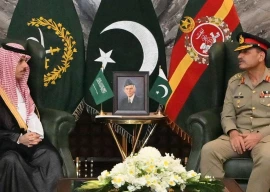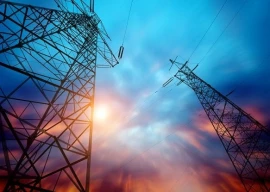
KARACHI:
22 economies of the world have been individually selected by global institutions and have been earmarked to lead global economic growth into the 21st century. These countries currently account for 75% of global GDP and 70% of its population. It is pertinent to note that these 22 nations account for a mere 10% of the countries in the World Bank’s global database.
The most encouraging aspect is that Pakistan is among these 22 select nations. In 2005 when all our economic indicators were positive and showing an upward trend, Pakistan was added to the list called NEXT-11, a group of 11 countries – Bangladesh, Egypt, Indonesia, Iran, Mexico, Nigeria, Pakistan, Philippines, Turkey, South Korea, and Vietnam – that global financial institutions and researchers felt would lead the future global economic growth, behind the G-7 countries – Canada, France, Germany, Italy, Japan, UK, and USA – and BRIC countries (abbreviation for Brazil, Russia, India, and China). It was a great honour and a testimony that we are among the largest contributors of the world.
As a background perspective, G-7 was created in 1986 and since then they have significant influence on regional as well as global policies regarding healthcare, education, carbon emission, and other sustainability initiatives. BRIC was coined in 2001 and reflected a shift in global economic power away from the developed G-7 economies and towards the developing world. These four countries, combined, account for more than a quarter of the world’s land mass and more than 40% of its population and it is estimated that BRIC economies will overtake G-7 economies, in size, by the year 2027. Next-11 economies have the potential of becoming the world’s largest economies within this century right behind G-7 and BRIC countries. The selection of Next-11 was based on macroeconomic stability, investment policies, size of economy, and future growth potential.
Do we still deserve to be part of this list?
Last few years have been very rough on Pakistan. With our lacklustre macroeconomic performance and deteriorating infrastructure, there is a high probability that international experts may decide to drop us from the NEXT-11 list unless we fix our structural issues and rebound back and show strong economic progress that we had displayed in early 2000. Reviewing Pakistan’s past performance trends, we see that in 2001 we had the lowest economic growth among all the 15 countries (Next-11 + BRIC), by 2004 our economic growth had risen to the top 30% percentile and we remained in the top 50% percentile in 2005 and 2006. After that it has continued to drop steadily and in 2011 we again hit rock bottom to 15 in the list.
Despite our lacklustre economic performance over the last few years, we have the potential, resources and competency to deliver significantly higher growth rates. However, to do so we require strong commitment from our government, bureaucracy and political leadership. We must first fix the security situation, followed by investing heavily in infrastructure especially energy reliability.
We also must focus on improving overall governance, intellectual property rights, and strengthening our investment opportunities to attract local and international investors. To make this growth sustainable we must invest significant resources in upgrading our education infrastructure as well as research and innovation standing.
I have no doubt that with the immense natural resources, 7th largest population coupled with the 10th largest workforce with three million workers entering workforce every year together with intelligent policies, we can get back our past glory. We just need a sincere qualified economic team and support from government institutions.
The writer works in the corporate sector and is active on various business forums and trade bodies.
Published in The Express Tribune, August 6th, 2012.
COMMENTS (19)
Comments are moderated and generally will be posted if they are on-topic and not abusive.
For more information, please see our Comments FAQ




















1701091268-0/Elon-Musk-(3)1701091268-0-270x192.webp)























Reema Amir perhaps has a point. Our being in debt can not be fixed on any government because we incurred expenses on avoidable military from the taxes collected - despite some grants, all the salary and perks went from our exchequer. We are a frontline state by choice.
Even today, qualified persons as aware and polished as our top 25% officers in BPS 20/19 are paid equal of US $ 100 per month in some of the Central Islamic States. We are damn inefficient and costly relative to the region. Imagine, for the salary of your guard or driver, you can get a young talented officer!
i am sorry to say, the glory you were talking about was superficial, we have great foreign debts after general's gov, and which result we are facing today in civilian gov, foreign aid rate was high in past, that's why we were enjoying the glory in being Next-11 list..Globalization is only good when "We think globally and act locally".
And yet people hate Musharraf and prefer 'democracy'.
Every basic input required for sustainable economic growth like mineral resources, cheap and young work force is available in Pakistan. However, the hindrance to it is absence of environment friendly for international investment which is a must for higher rate of annual growth. Look at the examples of China, India brazil, South Korea, south Africa. Create the right environment and reap the benefits, else some other country will occupy the seat of Pakistan in the Group of NEXT -11 list.
Yes, we deserve to be there because Pakistanis exhibit tremendous energy, both physical and imaginative.
@ Misbah I agree with u
Dear antanu g ... this is not the first time we have been included in up coming economies. Why I said stop dreaming because we really need to wake up instead of reaming in the false illusion. Since my birth I have been listening that Pakistan has a lot of potential and since twenty five years I have been dreaming that one day we will rise. That one day will not come till the time we dont wake up from the dream.
@Kapt Slim: "Stop dreaming ….".
Because to deserve dreaming positively one must be FREE. Freedom is what we fear most. Free people can never beg, borrow and steal. They work. That's a hard way to live.
Only political maturity and continuation of democratic system guarantees the success. If anyone wants any change, it should be legitimate, with following proper procedures and according to aspiration of majority. Now first time in history this nation shows a little bit decency by giving preference to negotiations and dialogue rather than destructive agitation and confrontation. If we continue the right path we will be in Gs.
@Kapt Slim: Why sir....let the bias not fog your mind.
To grow Pakistan's Economy Government should called up Economist Confrence Once a year to setup future planning .. I think Government should control their MNA's Expenses becauses a large part of our country budget is fixed for them and for our Pak Army ..To boost up Pak Economy, Government should take step and to fixed a certain amount for every 6 months Economy's Plan.
There is no doubt that Pakistan has immense potential of growth due to diversity of Resources and presence of industry which produce every type of product within the country, and which are also exported. Unique combination of resources are real potential of Pakistan. Pakistan economy is still depending a lot upon the agriculture sector, we need to see how this sector can really give more push to the economy and control inflation. In the last Ten years, Pakistan has shown growth which is noticeable in the Global horizon, however there is still more to be put in to to realize its potential for best results. What we need only is to have hardworking, sincere and honest leadership which would take this county to the new heights.
Do we still deserve to be part of this list? HELL YEAstrong text
Stop dreaming .....
In his recently published book "The Growth Map", Goldman Sachs' Jim O'Neill of BRIC fame has reiterated Pakistan's long term growth prospects as part of the Next 11 (N-11) group of nations. Answering a reporter's question about the growth prospects of GCC (oil-rich nations of Gulf Cooperation Council) at a recent investment conference in Dubai, he said: "Some GCC countries are well placed to be hubs for the BRIC and N-11-influenced world. I often think of Dubai as a kind of N-11 center, even the capital of the N-11 world, given its business adjacency to Egypt, Pakistan, Iran, Turkey, and, of course, India and Russia."
http://www.riazhaq.com/2012/03/pakistan-on-goldmans-bric-n11-growth.html
Mr Saad its time for you to do something rather that just state the obvious.
We definitely need electricity for that.